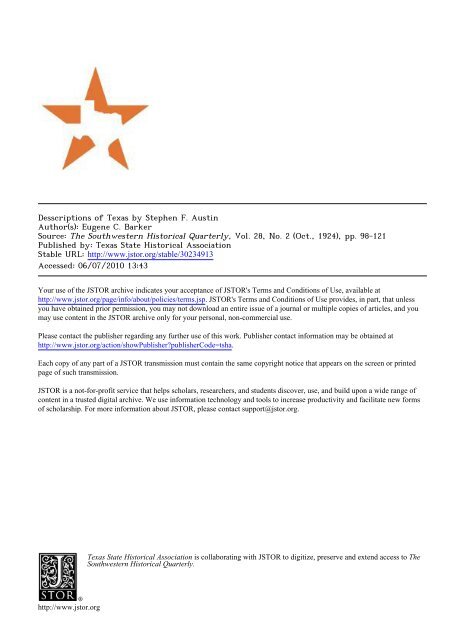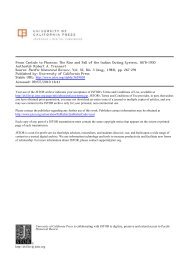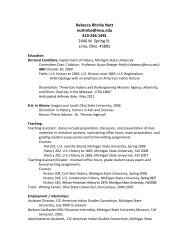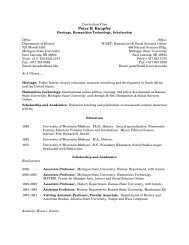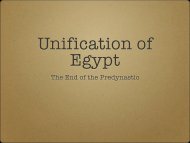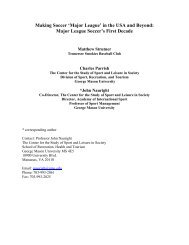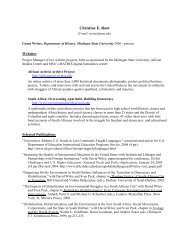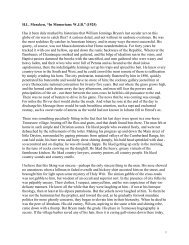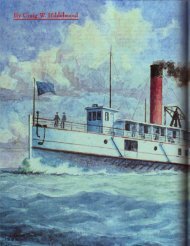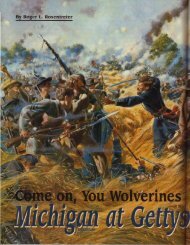Desscriptions of Texas by Stephen F. Austin - MSU Dept of History
Desscriptions of Texas by Stephen F. Austin - MSU Dept of History
Desscriptions of Texas by Stephen F. Austin - MSU Dept of History
You also want an ePaper? Increase the reach of your titles
YUMPU automatically turns print PDFs into web optimized ePapers that Google loves.
Descriptions <strong>of</strong> <strong>Texas</strong> <strong>by</strong> <strong>Stephen</strong> F. <strong>Austin</strong> 101visited and explored the country in the summer <strong>of</strong> 1821, andmade the necessary arrangements with the governor <strong>of</strong> the province.He returned to Louisiana, and in December <strong>of</strong> the sameyear arrived on the Brazos river, with a part <strong>of</strong> the families hewas authorized to colonize. After the independent governmentwas established, and organized, he visited the City <strong>of</strong> Mexico,and obtained a full confirmation <strong>of</strong> his grant to settle the colonyfrom the National Mexican Congress, and has subsequentlyobtained a large extension <strong>of</strong> the same. <strong>Texas</strong>, at the time heentered it, was entire wilderness with the exception <strong>of</strong> the oldSpanish posts <strong>of</strong> San Antonio de Bexar and La Bahia, and theywere poor and inconsiderable villages reduced to wretchednessand misery <strong>by</strong> the arbitrary and cruel measures <strong>of</strong> the Spanishgeneral in 1813 after the defeat <strong>of</strong> the Republicans on theMedina; and <strong>by</strong> the subsequent Indian war, with the Comanches,and other savages. Between the Sabine and San Antonio, a distance<strong>of</strong> 400 miles there was not twenty souls <strong>of</strong> civilized inhabitants,and the country was occupied in every direction <strong>by</strong> wanderingbands <strong>of</strong> the Comanches, Lipans, Tancawas, Wacos, Tawacanys,Karankaways and other Indians. The government at thisperiod (the winter <strong>of</strong> 1821-22) was unsettled, all Mexico was inrevolution. The Spanish power was prostrated, but much doubtand uncertainty prevailed as to the final result-public opinion,and parties vacillated between monarchy, aristocracy and Republicanism;and it would seem that even these flattering hopescould have <strong>of</strong>fered few inducements to enter <strong>Texas</strong> with families<strong>of</strong> women and children, under such circumstances. Col. S. F.<strong>Austin</strong>, and the families who embarked with him, in the arduouseffort <strong>of</strong> settling this wilderness, knew and fully understood theirsituation, and the risk, perils, and hardships they must necessarilybe exposed to. They had confidence in themselves, andrelied upon that confidence alone for safety, and protection andsuccess. The alarming and exaggerated rumors that went abroadrelative to the sufferings <strong>of</strong> the first settlers greatly impeded theprogress <strong>of</strong> the new settlements, and increased Col. <strong>Austin</strong>'s difficultiesin procuring emigrants. True it is, the first adventurerssuffered greatly. They did not taste bread for six months; their onlyhope for subsistence was the game <strong>of</strong> the forests until they raiseda crop; and they were constantly harrassed <strong>by</strong> Indian depreda-
102 Southwestern Historical Quarterlytions. The vessels sent round from New Orleans <strong>by</strong> <strong>Austin</strong> withprovisions and supplies were lost on the coast and plundered <strong>by</strong>the Indians, and many other casualties occurred; but great asthe obstacles were that opposed their settlements in this wilderness,their fortitude and perseverance was still greater, and successhas fully rewarded their toils.<strong>Austin</strong>'s colony at this time (August, 1828) contains about3000 inhabitants and is flourishing, the settlers are beginning toreap the fruits <strong>of</strong> their labors; they have opened extensive farms,and the produce <strong>of</strong> the soil far exceeds their most sanguine expectations.A number <strong>of</strong> cotton gins and mills are in operationand several more are building; about six hundred bales <strong>of</strong> cottonand eighty hogsheads <strong>of</strong> sugar will be made this season. Commercebegins to enliven the shores <strong>of</strong> the river, and peace andplenty everywhere prevails.There probably is not at this time such an opening on theglobe for industry and enterprise as in <strong>Austin</strong>'s colony. Land <strong>of</strong>good quality may be had in large tracts <strong>by</strong> emigrants <strong>of</strong> goodcharacter, which will enable a man <strong>of</strong> large family to settle allhis children around him; the cost will not exceed four cents peracre, including surveying, <strong>of</strong>fice fees, and all other charges, andfive and six years are allowed to pay a part <strong>of</strong> that in. Thosewho emigrate now will have none <strong>of</strong> the difficulties <strong>of</strong> the firstsettlers. Provisions are abundant and cheap, roads are opened.The Indians are subdued, and driven back and are all at peacethecountry is known, and an experiment <strong>of</strong> six years has, provedits healthfulness and value. At this time no one comes on anuncertainty-the government is settled on the basis <strong>of</strong> true Republicanism.The new settlers are represented and enjoy everycivil privilege that reasonable men need ask. Those who arehere are content, and say that this is the easiest and most favorableand munificent government they ever lived under.Slavery is prohibited <strong>by</strong> the Constitution, but contracts madewith servants or hirelings in a foreign country are guaranteed<strong>by</strong> a special act <strong>of</strong> the Legislature, as valid in this State.The general character <strong>of</strong> the settlers <strong>of</strong> <strong>Austin</strong>'s colony is that<strong>of</strong> moral, industrious and good citizens. The local governmenthas been administered without the aid or necessity <strong>of</strong> one soldierto enforce obedience. Crimes, rioting, and those disorders inci-
Descriptions <strong>of</strong> <strong>Texas</strong> <strong>by</strong> <strong>Stephen</strong> F. <strong>Austin</strong> 103dent to all new countries are almost unknown, and impartial menwill say that no new settlement on any frontier <strong>of</strong> the UnitedStates can boast <strong>of</strong> more good order, morality, and subordinationto the laws than <strong>Austin</strong>'s colony. It has been a rule with Colonel<strong>Austin</strong> from the beginning to receive none but good men and todrive away bad ones, and he will now receive none who do notpresent evidence <strong>of</strong> good character from the local authorities <strong>of</strong>the place where they remove from.Men <strong>of</strong> large families and small or no capital cannot do betterthan to emigrate to this country. <strong>Austin</strong> is authorized tosettle a large number <strong>of</strong> families, and his well known and establishedcharacter with the Mexican government--his experiencesin colonization, and his uniform devotion to the interest <strong>of</strong> thesettlers, to the accommodation <strong>of</strong> honest poor men, and to thegeneral prosperity <strong>of</strong> the country probably qualifies, him as wellto succeed as any other now engaged in enterprises <strong>of</strong> this kind.He was the first who attempted to colonize in <strong>Texas</strong>, he openedthe way, and has devoted seven years <strong>of</strong> the prime <strong>of</strong> his life tothis object, his present poverty as to monied capital or disposablemeans affords an unquestionable and honorable pro<strong>of</strong> that he hasbeen influenced more <strong>by</strong> the general good and prosperity <strong>of</strong> thesettlers than <strong>by</strong> views <strong>of</strong> individual pr<strong>of</strong>it, for had the reverse <strong>of</strong>this been his object, he has had abundant opportunities <strong>of</strong> speculating,but he could not embrace them without neglecting whathe deemed to be his duty to his settlers, and therefore he did not.The success <strong>of</strong> <strong>Austin</strong>'s colony in the wilderness <strong>of</strong> <strong>Texas</strong>,under the disadvantages and difficulties that opposed such anenterprise, affords a most striking and highly honorable example<strong>of</strong> North American enterprise, perseverance and fortitude, and ithas paved the way for the settlement <strong>of</strong> the whole <strong>of</strong> this fineand heret<strong>of</strong>ore uninhabited country.1831Emigration to <strong>Texas</strong> from EuropeThe encouragement given <strong>by</strong> the Mexican government and <strong>by</strong> thestate <strong>of</strong> Coahuila and <strong>Texas</strong> to emigrants to <strong>Texas</strong> from Europemerits the popular attention <strong>of</strong> those who have a desire to bettertheir fortunes <strong>by</strong> a removal to America. It is believed that
Descriptions <strong>of</strong> <strong>Texas</strong> <strong>by</strong> <strong>Stephen</strong> F. <strong>Austin</strong> 105easily made on the coast, and salt springs are very numerous invarious places in the interior.New Orleans, which is within three days' sail <strong>of</strong> the mouth<strong>of</strong> the Brazos or a short journey <strong>by</strong> land, the West Indies, andthe cities <strong>of</strong> Matamoras, Tampico, Vera Cruz, Campiche, etc.,on the Gulf <strong>of</strong> Mexico, will always afford a pr<strong>of</strong>itable market forsome <strong>of</strong> the articles <strong>of</strong> <strong>Texas</strong> produce, particularly horses, mules,oxen, and beeves for the New Orleans market and all kinds <strong>of</strong>provisions, stock, and lumber for the Mexican and West Indies.The interior <strong>of</strong> Mexico will also afford a market for many articles<strong>of</strong> <strong>Texas</strong> produce and manufacture.Galveston, Matagorda, Aranzaso, and the Nueces Bays, andthe mouth <strong>of</strong> the Brazos river are all good inlets. The two firsthave twelve feet <strong>of</strong> water over the bar, the other two bays haveeight feet and the mouth <strong>of</strong> the Brazos has six feet. Customhouses are established in Galveston and Matagorda bays, and atBrazoria near the mouth <strong>of</strong> the Brazos river. The other twobays are not regular ports <strong>of</strong> entry, owing to the wilderness state<strong>of</strong> the country round them, but will no doubt be opened as soonas the Irish colonies are filled up which have been commencedon that part <strong>of</strong> the coast <strong>of</strong> <strong>Texas</strong>, and which are now prosperous,considering the newness <strong>of</strong> their establishment.The rivers <strong>of</strong> <strong>Texas</strong> are the Sabine, Neches, Trinity, Brazos,and Colorado, all navigable a considerable distance into the interior,also the San Jacinto, Buffalo Bayou, San Bernard, LaBaca, Guadalupe, San Antonio, Aransaso, and Nueces all navigablea short distance. Of all the rivers <strong>of</strong> <strong>Texas</strong>, the Brazosand Colorado are the largest. The Guadalupe and San Antonioare very beautiful rivers <strong>of</strong> pure fountain water, and afford agreat many eligible situations for water mills, as also do the innumerablecreeks and branches <strong>of</strong> the other rivers.General Face <strong>of</strong> the Country<strong>Texas</strong> is divided into three distinct tracts or regions <strong>of</strong> country,whose characteristics are, in many respects, entirely different.These are the level, the undulating, and the mountainous regions.The whole coast <strong>of</strong> <strong>Texas</strong>, from the Sabine to the Nueces, israther low and very level, but is entirely free from marsh, somuch so that in most places a loaded wagon may be driven down
106 Southwestern Historical Quarterlyto the sea beach or shore <strong>of</strong> the bays without any difficulty.There is a belt <strong>of</strong> prairie along the coast which extends backeight or ten miles and is timberless except for the skirts on therivers and creeks, which reach to the beach.The level region extends back from the coast in a northwesterlydirection about seventy or eighty miles as far west as to thevicinity <strong>of</strong> the Guadalupe river, west <strong>of</strong> which to the Nueces theundulating lands reach to within twenty or thirty miles <strong>of</strong> thecoast.The country on the Sabine, Neches, Trinity, and San Jacintois heavily timbered and wooded with thick groves <strong>of</strong> good pine,cypress, oak, ash, and other timber. The level region extendsback about seventy miles from the coast in this section <strong>of</strong> <strong>Texas</strong>(east <strong>of</strong> San Jacinto). Above that to the north and northwestthe country is gently undulating to Red River, there being nopart <strong>of</strong> it mountainous or even sufficiently broken to be calledhilly. The thickly wooded lands continue quite to Red Rivernorth <strong>of</strong> the heads <strong>of</strong> the Sabine and Neches, and pretty highup on Trinity, above this and west <strong>of</strong> the headwaters <strong>of</strong> theSabine there is a considerable belt <strong>of</strong> gentle undulating prairiecountry extending up and down Red River which is thinly timbered,the groves being confined to the margins <strong>of</strong> the streams.The whole <strong>of</strong> this eastern and wooded region is very abundantlysupplied with living streams <strong>of</strong> pure water, which affordmany favorable sites for saw and other mills, either water orsteam. The lumber business from this quarter will be very valuableso soon as mills are put in extensive operation. There isnow one steam saw mill completed on the Buffalo Bayou, andanother is building on the east bank <strong>of</strong> San Jacinto near itsmouth. The soil in this wooded section is generally well adaptedto agriculture, though it is greatly inferior in fertility and inpasturage to the country on the Brazos, Colorado, and Guadaluperivers.The old Spanish military post and village <strong>of</strong> Nacogdoches issituated in the center <strong>of</strong> this section <strong>of</strong> <strong>Texas</strong>, about sixty mileswest <strong>of</strong> the Sabine. In 1819-20 it was totally broken up <strong>by</strong> therevolution and abandoned and so remained until S. F. <strong>Austin</strong>commenced the settlement <strong>of</strong> his colony on the Brazos river in1821. It is now a respectable village, and has a garrison <strong>of</strong>
Descriptions <strong>of</strong> <strong>Texas</strong> <strong>by</strong> <strong>Stephen</strong> F. <strong>Austin</strong> 107Mexican troops. The adjoining country, and between there andSabine has a considerable population <strong>of</strong> respectable farmers. Amilitary post and town was established in 1830 <strong>by</strong> order <strong>of</strong> hisexcellency General Teran, on the northeast bank <strong>of</strong> GalvestonBay, opposite the mouth <strong>of</strong> Trinity, and called Anahuac. Thecountry on Trinity river in the neighborhood <strong>of</strong> this place ispretty well settled with Americans and there is also a considerablesettlement <strong>of</strong> them low down on the Neches.Anahuac will no doubt become an important place, as it willcommand the trade <strong>of</strong> the Trinity river, and a considerable portion<strong>of</strong> the San Jacinto and Neches.That section <strong>of</strong> the level region <strong>of</strong> the coast situated betweenthe San Jacinto and the Guadalupe rivers, including the lowerparts <strong>of</strong> the Brazos, San Bernard, Colorado, and La Baca rivers,extends into the interior a northwesterly direction about eightymiles from the coast. The soil over the whole <strong>of</strong> this extensivesection is <strong>of</strong> the first quality, and probably is exceeded in fertility<strong>by</strong> no other tract <strong>of</strong> country on earth <strong>of</strong> equal size. Theland is sufficiently elevated to drain easily and rapidly afterheavy floods <strong>of</strong> rain, and the supply <strong>of</strong> permanent water andtimber is quite abundant.The alluvial or bottom lands <strong>of</strong> the Brazos, San Bernard, andColorado are from four to fifteen miles wide, heavily timbered,covered with immense and almost impenetrable cane brakes, freefrom all injurious overflows from the rivers, and entirely clear <strong>of</strong>large lakes, wet swamps or marsh. The Guadalupe, La Baca,Navidad, and a number <strong>of</strong> creeks that intersect this level regionalso afford large bottoms or tracts <strong>of</strong> alluvian soil on their margins,and are well timbered. The intervening country betweenthe rivers and creeks is open, level, rich, and elevated prairie,clothed with a very thick and luxuriant growth <strong>of</strong> grass <strong>of</strong> agood quality for pasturage. Very pure and palatable water isfound in wells from twelve to twenty feet deep all over this levelregion, and the water <strong>of</strong> the rivers and creeks is also good andwholesome. Near the mouth <strong>of</strong> the Brazos a town has beenfounded <strong>by</strong> S. F. <strong>Austin</strong> called Brazoria, which is the commercialdepot <strong>of</strong> that river, and <strong>of</strong> the adjoining country on theSan Bernard river. It is improving and flourishing very rapidlyand must become a large and very important place in a few years.
108 Southwestern JiTistorical QuarterlyA town has also been laid <strong>of</strong>f at the mouth <strong>of</strong> the Colorado riveron the Bay <strong>of</strong> Matagorda, which is called Matagorda. Thisplace will become the depot <strong>of</strong> the Colorado river and <strong>of</strong> a veryrich and extensive country.The town <strong>of</strong> San Felipe de <strong>Austin</strong>, founded in 1824 <strong>by</strong> S. F.<strong>Austin</strong> and the commissioner <strong>of</strong> the government, Baron de Bastrop,as the capital <strong>of</strong> <strong>Austin</strong>'s colony, is situated on the westbank <strong>of</strong> the Brazos river about eighty miles <strong>by</strong> land and twohundred <strong>by</strong> water from its mouth, and at the upper or northernlimits <strong>of</strong> the level region. It is the residence <strong>of</strong> the empresario,S. F. <strong>Austin</strong>, and the state and municipal <strong>of</strong>ficers <strong>of</strong> the jurisdiction,and all the land and judicial business is transacted there.Above, and to the northwest <strong>of</strong> the level region last noticed,the country is beautifully and gently undulating. This description<strong>of</strong> land extends up the Brazos, Colorado, and Guadaluperivers one hundred and fifty to two hundred miles above theupper limits <strong>of</strong> the level region and reaches to the mountainranges <strong>of</strong> <strong>Texas</strong>. This undulating region is probably as desirablea country for all the wants and necessities <strong>of</strong> man as anyother on earth. The soil is generally <strong>of</strong> first quality. The climateis much more wholesome and pleasant than in the levelregion. There are no mosquitoes or horse flies <strong>of</strong> any consequence.The surface is beautifully and very fancifully diversifiedand checkered <strong>of</strong>f into small prairies and woodland tracts,thus presenting to the farmer large fields <strong>of</strong> rich lands cleared<strong>by</strong> the hand <strong>of</strong> nature and ready for the plough. The surroundinggroves <strong>of</strong> woods afford the best <strong>of</strong> oak, cedar, and other timberat a convenient distance for building and fencing. This wholetract <strong>of</strong> undulating country is very well watered, and aboundsin permanent running springs and creeks which all have moreor less bottom lands, and are very beautifully lined with thel<strong>of</strong>ty forest trees <strong>of</strong> the rich alluvial soils. The undulations arein many places quite elevated, but rise gently and a long distancebefore you reach the summit. There are but very fewsteep or abrupt breaks or cliffs, and nothing that would be calledhilly. From the summits <strong>of</strong> these elevations the landscape isvery richly and agreeably diversified <strong>by</strong> the gentle and extendedslopes. The round tops <strong>of</strong> the elevations here crowned with agrove and there presenting a bald surface <strong>of</strong> grass, the rich pale
Descriptions <strong>of</strong> <strong>Texas</strong> <strong>by</strong> <strong>Stephen</strong> F. <strong>Austin</strong> 109yellowish green <strong>of</strong> the small prairies or natural lawns, the darkfoliage <strong>of</strong> the cedars, l<strong>of</strong>ty woods that fringe the banks <strong>of</strong> thecreeks and drains which wind their serpentine course through thesmall valleys and natural meadows at the feet <strong>of</strong> the undulations,all combined present a landscape at once pleasing to theeye, and cheering to the imagination, which in its fancy fills thescene under view with fine forms, the abode <strong>of</strong> health, plenty,cheerfulness, and happiness.A military post and village have been established on the westbank <strong>of</strong> the Brazos above the upper road and about twelve milesbelow the mouth <strong>of</strong> the San Andress river, and about one hundredmiles above San Felipe de <strong>Austin</strong>. This post is calledTenoxticlan [Tenoxtitlan] and is beautifully situated and abundantlysupplied with large and pure fountains <strong>of</strong> water. It isunderstood to be the intention <strong>of</strong> government to keep up a considerablegarrison at this place to protect the northern frontier<strong>of</strong> the colony from the Indians, and also to promote the settlement<strong>of</strong> the interior country on the Brazos. Tenoxticlan bidsfair to become a considerable inland town. The country roundit is very fertile and pleasant, and the Brazos river is navigableabove this in time <strong>of</strong> freshets.The level region lying to the west <strong>of</strong> Guadalupe and betweenthat river and the Nueces differs from the other parts <strong>of</strong> thecoast in being much more scarce <strong>of</strong> timbers, in fact almost destituteexcept on the San Antonio and Aransaso rivers where thereis a sufficiency, though not an extensive body. The soil is veryrich and fertile, the water good. The climate is more pleasantand wholesome than farther east, and the pasturage much better,being composed <strong>of</strong> a different kind <strong>of</strong> grass called the Muskitegrass. It is fine, seldom exceeds six inches in height, resemblesthe blue grass, and is the most nutritious pasturage in the country-italso has the advantage <strong>of</strong> being green all winter.Two Irish colonies have been contracted with the government<strong>by</strong> four gentlemen <strong>of</strong> that nation, on the Nueces and betweenthat river and the Guadalupe. These colonies have been commenced,and are in a state <strong>of</strong> favourable advancement and <strong>of</strong>fera very fine opening to Irish emigrants.The country back and to the northwest <strong>of</strong> the level region lastmentioned (between the Guadalupe and Nueces) is undulating,
110 Southwestern Historical Quarterlymoderately so at first, and rising higher <strong>by</strong> degrees to the mountainrange about two hundred miles distant. The whole <strong>of</strong> thissection affords the best <strong>of</strong> pasturage, being principally <strong>of</strong> Musquitegrass and is probably better adapted to graze in than anyother part <strong>of</strong> <strong>Texas</strong>, the soil in general is good-timber andwater are scarce, the Nopal, or prickly pear grows here in greatquantities and very large. Limestone is abundant, to within fifteenor twenty miles <strong>of</strong> the coast. There is a low tree belongingto the locust family, called the Muskite, which is very abundantall over this section. It seldom grows larger or taller than avery large peach tree, which it resembles very much in its generalappearance. The leaves are those <strong>of</strong> the honey locust, onlysmaller, it has a small thorn, it bears a bean pod about the sizeand shape <strong>of</strong> the common snap bean, which is very sweet, is used<strong>by</strong> the Indians in time <strong>of</strong> scarcity <strong>of</strong> food, and is equal to cornto fatten horses, cattle or hogs. The wood <strong>of</strong> this tree is verylasting, fully as much so as cedar, and is very valuable for postsin making post and rail fences. It is also better for fire woodthan ash or hickory. The leaves <strong>of</strong> the Muskite are thought tobe the best food that can be obtained for goats, and as thosetrees are low and in many places are only shrubs the goats keepfat <strong>by</strong> browsing on them when there is no grass. The tenderleaves and fruit <strong>of</strong> the prickly pear is very nutritious food forhorses and horned cattle, particularly the latter, which fatten onthem.The town <strong>of</strong> San Antonio, or San Fernando de Bexar, is situatedin this region on the San Antonio river in latitude 29 25'north, longitude 990 30' west. This place is the capital <strong>of</strong><strong>Texas</strong>, and contains 2500 inhabitants. The village <strong>of</strong> Goliad(formerly La Bahia) is situated on the same river in latitude280 55' at the upper extremity <strong>of</strong> the level region and abouttwenty-five miles from the coast.The mountain range extends from the mouth <strong>of</strong> Rio Puerco,a branch <strong>of</strong> Rio Bravo, in a northeasterly direction, and enters<strong>Texas</strong> at the sources <strong>of</strong> the Nueces river, thence continuing itsnortheasterly direction to the head <strong>of</strong> the San Saba, a branch <strong>of</strong>Colorado, it bends more to the east down the San Saba andcrosses the Colorado below the mouth <strong>of</strong> that river, and is finallylost in the undulating country on the west <strong>of</strong> the Brazos near the
Descriptions <strong>of</strong> <strong>Texas</strong> <strong>by</strong> <strong>Stephen</strong> F. <strong>Austin</strong> 111mouth <strong>of</strong> the San Andress, a considerable tributary <strong>of</strong> that river,about two hundred miles above the town <strong>of</strong> San Felipe de <strong>Austin</strong>.The mountain range does not cross the Brazos river, and the countryeast <strong>of</strong> that river and up the Trinity is gentle, undulating,and in some places quite level.High up on the Brazos river there is a large mass <strong>of</strong> metalwhich it is said is worshiped <strong>by</strong> the Comanche Indians. It is<strong>of</strong> several tons weight-is bright--has no rust or oxide <strong>of</strong> anykind on its surface and is perfectly malleable. A large piece <strong>of</strong>this metal was taken at a great expense to New York <strong>by</strong> way<strong>of</strong> Natchitoches many years since, under the belief that it wasplatina, but it is said that the experiments made <strong>by</strong> Dr. Mitcheland other chemists in that city proved that it was pure iron ina malleable state. The existence <strong>of</strong> such a mass <strong>of</strong> metal is beyondall doubt and can be attested <strong>by</strong> many persons in Natchitochesand in <strong>Texas</strong> who have been to the place.eSpurs <strong>of</strong> the mountain range extend southwardly down therivers Medina and Guadalupe to the vicinity <strong>of</strong> Bexar and withinsight <strong>of</strong> the road leading from that place to Nacogdoches calledthe upper road, and also down the rivers Llano and Pedernales,branches <strong>of</strong> the Colorado. Similar spurs also stretch up theColorado above the mouth <strong>of</strong> San Saba and round the headwaters<strong>of</strong> the San Andres between the Colorado and Brazos.These mountains are <strong>of</strong> third and fourth magnitude in point <strong>of</strong>elevation. Those <strong>of</strong> San Saba are the highest. They are inmany places thickly covered with scrub<strong>by</strong> cedar, live oak, andother trees. Granite, limestone, quartz, and other species <strong>of</strong>mountain rock usually found in mountains are very common,and it is believed they abound in mineral wealth, particularlyon the San Saba, where traditions say a rich silver mine was successfullywrought many years since, until the Comanche Indianscut <strong>of</strong>f the workmen. Very large and fertile valleys <strong>of</strong> richarable alluvial land are found all through this range, particularlyon the San Saba, Llano, Pedernales, Conchos and PecanBayou, branches <strong>of</strong> the Colorado, on the San Andress andBosque, a branch <strong>of</strong> the Brazos, on the Guadalupe, Medina, andNueces. The sides and tops <strong>of</strong> the mountains are also in most'In the margin <strong>Austin</strong> writes <strong>of</strong> this paragraph:place on the second page.""Would be more in
112 Southwestern Historical Quarterlyplaces susceptible <strong>of</strong> cultivation. The soil is generally rich andwell adapted to wheat and other small grains, and to the vineand northern fruits. The pasturage for horses, cattle, sheep andgoats is very good all over these mountains, particularly for thetwo latter, and there is no doubt this section <strong>of</strong> <strong>Texas</strong> will affordvery large quantities <strong>of</strong> wool for home manufacture, or for exportation.This range <strong>of</strong> high land is no doubt <strong>of</strong> very greatadvantage to <strong>Texas</strong>. It renders the air more pure, and aboundsin large fountains <strong>of</strong> pure water, which flow <strong>of</strong>f with a rapidcurrent and uniting form the large rivers <strong>of</strong> the central andwestern parts <strong>of</strong> <strong>Texas</strong>--all <strong>of</strong> which are much more wholesomeand limpid than those to the east <strong>of</strong> the Brazos.This mountain region will also at some future time supply all<strong>Texas</strong> with good wheat flour, and afford a considerable surplusfor exportation also with rye, hemp, flax, and northern fruits andwine. Iron, lead, and several other valuable metals will be suppliedfrom this section, and also stone coal. It will be a veryfavourable country for raising fine horses; the climate and pasturagewill suit them better than in the level and hot regionsnear the coast.North <strong>of</strong> this mountain range and on the extreme head <strong>of</strong> theBrazos and Colorado the country becomes level and forms highand interminable prairies, which stretch to the north and northwestbeyond the Red and the Arkansas rivers and are lost in thevast ocean <strong>of</strong> prairies which extends to the heads <strong>of</strong> Missouriand to the Rocky Mountains.<strong>Texas</strong>, as an extensive country, is probably the most desireablepart <strong>of</strong> North America-its climate is diversified, salubrious, andpleasant-it affords every species <strong>of</strong> soil which can be found inlevel, alluvial, undulating, or mountainous countries, embracingall the varieties <strong>of</strong> clayey, sandy, pebley, rockey, alluvial, and alltheir intermixtures. It is sufficiently supplied with good timberand wood lands-also with the most useful metals. Its riversand harbors are abundantly sufficient for all the purposes <strong>of</strong> commerce,and it is conveniently situated on the coast <strong>of</strong> theMexican Gulf to trade with the United States <strong>of</strong> the North, theMexican ports, the West Indies or with Europe. It is susceptible<strong>of</strong> great internal improvements <strong>by</strong> rail or turnpike roads andcanalling.
Descriptions <strong>of</strong> <strong>Texas</strong> <strong>by</strong> <strong>Stephen</strong> P. <strong>Austin</strong> 113The question may be asked why has this very desireable countrynever been heard <strong>of</strong> or settled before? The answer is plain.The Spanish government locked up <strong>Texas</strong>, as it did all its Americanpossessions, and even excluded visitors and travellers. Inconsequence <strong>of</strong> this policy <strong>Texas</strong> remained unknown and an entireand howling wilderness filled with uncivilized Indians, fromthe limits <strong>of</strong> Louisiana to the villages <strong>of</strong> La Bahia (now Goliad)and San Antonio de Bexar, until the year 1821, when Mr. Moses<strong>Austin</strong> <strong>of</strong> Missouri obtained permission to settle a colony <strong>of</strong>three hundred families in <strong>Texas</strong>. He died in June <strong>of</strong> that year,and his son S. F. <strong>Austin</strong> explored the country during that summerand in the following winter he commenced the settlement<strong>of</strong> <strong>Austin</strong>'s colony on the Brazos and Colorado rivers. After tenyears <strong>of</strong> most untiring perseverance he has fully succeeded inredeeming from the wilderness all that part <strong>of</strong> the coast <strong>of</strong><strong>Texas</strong> lying between and around Galveston and Matagorda bays,and as far into the interior as to the upper or San Antonioroad. <strong>Austin</strong>'s colony has now (1831) upwards <strong>of</strong> six thousandinhabitants, principally North Americans, and some English,Irish, and Germans. Very rigid rules were adopted <strong>by</strong> <strong>Austin</strong>,under the orders <strong>of</strong> government, to exclude all men <strong>of</strong> bad characterand dissolute habits from his colony, which is composed <strong>of</strong>farmers <strong>of</strong> great respectability and industry. The most conclusiveevidence that can be presented <strong>of</strong> <strong>Austin</strong>'s fidelity and carein the discharge <strong>of</strong> his duties and <strong>of</strong> the high standing and respectability<strong>of</strong> his colony, is the fact that both himself and thecolony possess the full confidence <strong>of</strong> the Mexican government,and have uniformly received the protection and cordial approbation<strong>of</strong> all the superior Federal and State <strong>of</strong>ficers.This colony contains many large and productive farms, andthe crop <strong>of</strong> cotton in 1831 was upwards <strong>of</strong> one thousand bales(<strong>of</strong> five hundred pounds <strong>of</strong> clean cotton each bale) and in 1832it will greatly exceed that amount. Considerable quantities <strong>of</strong>provisions are raised <strong>of</strong> all kinds which might be plenty andcheap, and besides this, the introduction <strong>of</strong> provisions, framehouses, and lumber from foreign countries is permitted <strong>by</strong> lawfor the present free <strong>of</strong> duty which will allow emigrants to bringsupplies with them.Agreeably to the existing laws European emigrants are pre-
114 Southwestern Historical Quarterlyferred (except Spaniards) to any others, and important advantagesare given to them over North Americans from the UnitedStates. There cannot be a doubt but that industrious farmersand capitalists would materially benefit themselves <strong>by</strong> a removalto <strong>Texas</strong>. The industrious and economical <strong>of</strong> the former wouldsoon advance their fortunes and make them independent <strong>by</strong> agriculture,and the capital <strong>of</strong> the latter invested in manufactories,agriculture or commerce would yield them an immense interest.The quantity <strong>of</strong> land that is granted to settlers is <strong>of</strong> itself ahandsome fortune. Agreeably to the existing colonization lawsa family gets one league <strong>of</strong> land and a single man the quarter<strong>of</strong> a league. A Mexican league is equal to four thousand fourhundred and twenty-eight acres, English measure. The wholecost <strong>of</strong> a league will in no case exceed four cents pr. acre, includingthe surveying, establishing the corners, <strong>of</strong>fice and commissioner'sand government fees and charges, and all other expenseswhatever. For a considerable portion <strong>of</strong> this small suma long credit <strong>of</strong> from one to four, five, and six years is given.S. F. <strong>Austin</strong>, who has been successfully engaged in colonizingfor the last ten years, and whose character for good faith andintegrity, and high standing with the government are well established,has authority to settle European families on the vacantlands remaining within the limits <strong>of</strong> his old colony and in anew addition which includes all the undulating and a part <strong>of</strong>the mountain regions on and between the Brazos and Coloradorivers. Emigrants are not confined to <strong>Austin</strong>'s colony, the whole<strong>of</strong> <strong>Texas</strong> is open to them and they can settle in any part <strong>of</strong> it<strong>by</strong> applying to the proper authority for permission, and complyingwith all the legal requisites. The colony, however, clearlypresents more advantages than any other part <strong>of</strong> the country,owing to its advanced state--the good moral character <strong>of</strong> its inhabitants--theorganization <strong>of</strong> its local government-and thefacilities <strong>of</strong> procuring accommodations immediately on landing,provisions, and the means <strong>of</strong> transportation (horses, wagons,etc.) into the interior <strong>of</strong> the country. Also in the colony allthe business <strong>of</strong> the settler, writing petitions, translating, andinterpreting is done for him and information is given as to whatland is vacant and what is not, and its situation and quality,the charges for all which are included in the before mentioned
Descriptions <strong>of</strong> <strong>Texas</strong> <strong>by</strong> <strong>Stephen</strong> F. <strong>Austin</strong> 115sum <strong>of</strong> four cents pr. acre. <strong>Austin</strong>'s object never has been amere speculation, on the contrary, he has always compliedrigidly and scrupulously with his contracts and obligations asa colonizing agent, and as an <strong>of</strong>ficer <strong>of</strong> this government andlabored to settle this country with moral, and industrious farmers.No money is required <strong>by</strong> him <strong>of</strong> the settler until he hasfirst examined the land, or is satisfied as to its quality and hasreceived the legal title for it in due form from the governmentcommissioner appointed to issue land titles or patents.None but emigrants <strong>of</strong> the best class as to moral industriousand sober habits and respectable character and standing in thecountry where they remove from will be received <strong>by</strong> <strong>Austin</strong>,and each one will be required to accredit his character <strong>by</strong> evidencefrom the civil or judicial authority <strong>of</strong> the place <strong>of</strong> governmenthe removes from, and no one need apply for admissioninto this colony without such evidence properly authenticated toavoid fraud or impositions. Also, none need apply or expect toget a title for land in the colony or in any other part <strong>of</strong> <strong>Texas</strong>until after he has actually removed his family and settled himselfpermanently in the country. The idea which seems to haveprevailed in New York and other parts <strong>of</strong> the United Statesthat land can be held in <strong>Texas</strong> <strong>by</strong> foreigners who live in a foreigncountry, or who are not legally naturalized, is totally incorrectand in direct opposition to all the land laws, regulations,or even customs <strong>of</strong> the Mexican government. An actual removalto the country is therefore necessary before any title can issue;and an actual occupation and cultivation <strong>of</strong> the land granted,within the time prescribed <strong>by</strong> law, are indispensable requisitesto perfect the title, after it is issued. Those who have any idea<strong>of</strong> removing to <strong>Texas</strong> would do well to keep these facts in remembrance.The political constitution <strong>of</strong> the state <strong>of</strong> Coahuila and <strong>Texas</strong>prohibits slavery forever within its territory, so that after theslaves are dead who were introduced before the constitution waspublished, <strong>Texas</strong> will be entirely clear <strong>of</strong> that worst <strong>of</strong> reproachesagainst a free and enlightened people. The exclusion<strong>of</strong> slavery opens a vast field in <strong>Texas</strong> for the enterprise andpr<strong>of</strong>itable employ <strong>of</strong> white laborers. Experience has clearlyproved for ten years past that white men can labor in <strong>Texas</strong> as
116 Southwestern Historical Quarterlywell and as safely to their health as anywhere else. They mustuse some precautions it is true the first year until they are somewhatacclimated, and there never is any urgent necessity forhard labor on a farm, or exposure to the heat <strong>of</strong> the sun afterthe month <strong>of</strong> July. All the heavy part <strong>of</strong> the labor on a farmis done during the winter, spring, and autumn months. In thewinter the land is cleared, fenced, ploughed and prepared forplanting. In February and March it is planted. Before Julythe crops are all worked and weeded and finally laid <strong>by</strong>, as thefarmers term it. In October and November the crops are gathered.Wheat, rye, and other small grains ripen and are reapedthe last <strong>of</strong> May, before the hot weather comes on. English,Irish, German, Dutch, French, etc., farmers, and capitalists whoemigrate to <strong>Texas</strong>, would do well to bring a number <strong>of</strong> familieswith them as laborers, bound under written contract to serve fora term <strong>of</strong> years for certain fixed and specified wages. Such contractswould be binding and could be enforced <strong>by</strong> the existinglaws. It is confidently believed <strong>by</strong> the writer <strong>of</strong> this that if<strong>Texas</strong> were to be explored <strong>by</strong> an English, German, Dutch, orFrench gentleman <strong>of</strong> such known respectability and character inhis own country, as would give full credit to his statements andrepresentations after he returned, it would be the means <strong>of</strong> benefittinghimself and a large number <strong>of</strong> his countrymen <strong>by</strong> inducingthem to emigrate.Many erroneous opinions and false and unjust impressionsprevailed in England some time ago, in consequence <strong>of</strong> the statementsmade in the English parliament <strong>by</strong> several distinguishedmembers, in the debate relative to Mexican affairs. Sir RobertWilson and others thought proper to state, in that debate, thatthe colonists <strong>of</strong> <strong>Texas</strong> had rebelled, that they were composed <strong>of</strong>fugitives and turbulent persons, squatters, etc., and that theMexican government had sent a force <strong>of</strong> 4,000 men to expelthem from the country, etc., etc. Now the fact is, such statementsnever had the least foundation in truth, and evidently musthave been made from erroneous information. The colonists <strong>of</strong><strong>Texas</strong> were invited into the country <strong>by</strong> the colonization laws <strong>of</strong>the Mexican government, and did not intrude themselves intoit <strong>by</strong> force and illegally. The settlers <strong>of</strong> <strong>Austin</strong>'s colony so farfrom rebelling or manifesting anything like discontent, have on
Descriptions <strong>of</strong> <strong>Texas</strong> <strong>by</strong> <strong>Stephen</strong> F. <strong>Austin</strong> 117various occasions repelled the inroads <strong>of</strong> hostile Indians, andmaintained good order and the authority <strong>of</strong> the governmentwhenever it was disturbed. This colony, the first that was undertaken,the only one that has fully succeeded, has sustaineditself and the authority <strong>of</strong> government in the midst <strong>of</strong> a distantand isolated wilderness, without the aid <strong>of</strong> one soldier or <strong>of</strong> onedollar from the Mexican government. It is well known that thesettlers <strong>of</strong> <strong>Austin</strong>'s colony are not illegal intruders or squatters.The single fact that the founder <strong>of</strong> this colony is a member<strong>of</strong> the legislature or Congress <strong>of</strong> the State <strong>of</strong> Coahuila and<strong>Texas</strong>, and was elected to that <strong>of</strong>fice <strong>by</strong> the votes <strong>of</strong> his settlers,ought to be sufficient and conclusive evidence as to this point,for had he, or his colonists intruded themselves illegally into thecountry, the Legislature would certainly never have permittedhim to take his seat, neither would the right <strong>of</strong> suffrage havebeen recognized in the colonists, a right which can only be exercised<strong>by</strong> naturalized citizens. The motto adopted <strong>by</strong> <strong>Austin</strong>when he began his colony was "Fidelity and gratitude to Mexico,and to be true and faithful to her interests, and also to the justrights and interests <strong>of</strong> his colonists." This motto has been andis the great governing principle <strong>of</strong> the settlers. They will nodoubt continue to be, as they ever have been, true and faithfulto the government <strong>of</strong> their adoption, and also true to themselves.Should their adopted country and government be unjustlyand wantonly assailed <strong>by</strong> the United States <strong>of</strong> the North(as the British orators most erroneously and without any reasonunjustly supposed it would be) or <strong>by</strong> any other power whatever,they would be amongst the first to take up arms in itsdefence and risk their property and lives to sustain the independenceand constitution <strong>of</strong> Mexico; and on the other handshould they be unjustly and arbitrarily oppressed and theirrights <strong>of</strong> property or <strong>of</strong> persons be wantonly trampled upon,they will <strong>of</strong> course resist, and defend their property and persons tothe utmost <strong>of</strong> their power, as Englishmen, and as the Parliamentorators themselves would do under similar circumstances. Buton this subject, there have prevailed in the United States <strong>of</strong> theNorth as many and as gross and utterly unfounded errors asthose above alluded to in England. The colonists <strong>of</strong> <strong>Texas</strong> upto the present time have not been oppressed <strong>by</strong> the government.
118 Southwestern Historical QuarterlyThey are satisfied and have full confidence in the justice andliberality <strong>of</strong> their adopted government. It is truly unfortunatethat any erroneous opinions: should prevail on these subjects,in Europe or in the United States, or amongst the Mexican people,for such errors tend to prevent the emigration <strong>of</strong> many goodmen who would benefit themselves greatly <strong>by</strong> a settlement in<strong>Texas</strong>; and also they cause remarks and illiberal reflectionsagainst the colonists <strong>of</strong> <strong>Texas</strong> on the one hand, or against theMexican government on the other which do great harm, andfoment jealousies, ill will, and want <strong>of</strong> confidence where there isno just foundation for anything <strong>of</strong> the kind.It is not the object <strong>of</strong> the writer <strong>of</strong> the foregoing remarks toinduce any person to emigrate to <strong>Texas</strong> without first satisfyinghimself as to every particular connected with the subject. Hewishes no one to leap in the dark. On the contrary his objectis to induce inquiry and a full investigation <strong>of</strong> the matter.Europeans who feel any interest about <strong>Texas</strong> can no doubt obtaincorrect and authentic information <strong>by</strong> applying direct to thediplomatic agents <strong>of</strong> their respective governments at the City <strong>of</strong>Mexico, who can procure copies <strong>of</strong> the national colonization law<strong>of</strong> 18 August, 1824, and <strong>of</strong> the law on the same subject <strong>of</strong> theState <strong>of</strong> Coahuila and <strong>Texas</strong> <strong>of</strong> 24 March, 1825. Should a number<strong>of</strong> persons, a whole village <strong>of</strong> Germans or Dutch, for instance,wish to emigrate, it would be a good plan to send a specialagent to examine the country and make all the necessary arrangements,and then present a detailed report <strong>of</strong> his observationsto those who sent him.Europeans wishing to settle in <strong>Austin</strong>'s colony can procureevery necessary information <strong>by</strong> applying or writing to S. F. <strong>Austin</strong>,or to Samuel M. Williams, who has been taken in <strong>by</strong> <strong>Austin</strong>as a partner in the last contract with government. Letters tothose persons must be directed to the Town <strong>of</strong> San Felipe de<strong>Austin</strong>, <strong>Texas</strong>, and could be sent through some commercial housein New Orleans.December, 1831.1833Number <strong>of</strong> Population. Municipality <strong>of</strong> Bexar, includingthe four missions <strong>of</strong> San Jose, San Juan, Espada, Concepci6n,and the Ranches upon the Bejar River........ 4,000
Descriptions <strong>of</strong> <strong>Texas</strong> <strong>by</strong> <strong>Stephen</strong> F. <strong>Austin</strong> 119Municipality <strong>of</strong> Goliad, including the towns <strong>of</strong> SanPatricio and Guadalupe Victoria.................... 2,300Municipality <strong>of</strong> Gonzales............................. 1,600Municipality <strong>of</strong> <strong>Austin</strong>, including the towns <strong>of</strong> Bastrop,MIatagorda and Harrisburg, and settlements upon theColorado and San Jacinto Rivers, and the new town<strong>of</strong> Tenoxtitlan ....................................12,600Municipality <strong>of</strong> Liberty, including the settlements <strong>of</strong>Anahuac, Galveston and Bevil ...................... 4,500Municipality <strong>of</strong> Brazoria, including the town <strong>of</strong> Velasco. 4,800Municipality <strong>of</strong> Nacogdoches, including the settlements <strong>of</strong>the Ayish, Trinity, Neches, Attoyac, Tenaha, Sabine andPecan Point ......................................16,700Total number <strong>of</strong> population ..................... 46,500The wandering tribes <strong>of</strong> Indians and half civilized persons,whose number passes twenty thousand, are not included in thisenumeration.Products. Those <strong>of</strong> <strong>Texas</strong> are: Cotton, sugar, tobacco, indigo,edible grains and vegetables <strong>of</strong> various kinds; flocks, lumberand boards, leather goods and hides.Mills. In the municipalities <strong>of</strong> <strong>Austin</strong> *and Brazoria thereare thirty cotton-gins, two steam sawmills and grist mills, sixwater-power mills, and many run <strong>by</strong> oxen and horses.In Gonzales there is a water-power mill on the Guadalupe riverfor sawing lumber and running machinery (mover maquinas),which is <strong>of</strong> much importance, since this mill supplies the towns<strong>of</strong> Gonzales and Goliad and the city <strong>of</strong> Bexar with boards(tablas) .The municipalities <strong>of</strong> Liberty and Nacogdoches are very wellprovided with mills and gins, and there is great progress inthis industry in all parts <strong>of</strong> <strong>Texas</strong>.General Observations. The planting <strong>of</strong> cotton is very generaland well advanced in all parts, and the yield this year will bemore than one hundred and fifty thousand arrobas ginned andclean, equal to six hundred thousand arrobas with the seed.33An arroba is equal to twenty-fivepounds.
120 Southwestern Historical QuarterlyThe raising <strong>of</strong> cattle and hogs has increased with so muchrapidity that it is difficult to form a calculation <strong>of</strong> their number.The price for which they sell will give you an idea <strong>of</strong>their abundance.Fat beeves <strong>of</strong> from twenty to thirty arrobas are worth fromeight to ten dollars. Fat hogs <strong>of</strong> from eight to twelve arrobasare worth three and a half to five dollars each, and lard in proportion.Butter and cheese, corn, beans, and all kinds <strong>of</strong> vegetablesabound.The sowing <strong>of</strong> wheat has not progressed so much, because theclimate is not suitable for this grain in the settled region nearthe coast.The raising <strong>of</strong> horses and mules has progressed a good deal,although not in comparison to what it will do when the countryis settled in the interior and the Indians subdued, who now maketheir raids to steal horses.In the Bay <strong>of</strong> Galveston there is a steamship, and a companyhas been formed in <strong>Austin</strong> and Brazoria for the purpose <strong>of</strong> bring-ing one to the Brazos River. There is also a plan to open acanal to join the Brazos River with the Port <strong>of</strong> Galveston, andanother to join the two Bays <strong>of</strong> Matagorda and Galveston.The settled part <strong>of</strong> the country is provided with good roadsand there are various new projects and enterprises for betteringthe navigation <strong>of</strong> the rivers with oar-boats and steamboats forthe purpose <strong>of</strong> facilitating the transport <strong>of</strong> the agriculturalproducts <strong>of</strong> the interior <strong>of</strong> <strong>Texas</strong> to the coast.There are no schools or academies in <strong>Texas</strong> endowed or established<strong>by</strong> the state, but there are private schools in all partsand very good ones; and as soon as there is a local governmentto give form and protection to education there will be muchprogress in this direction.The inhabitants <strong>of</strong> <strong>Texas</strong> are in general farmers who own theirlands; there are few among them who do not know how to readand write, or who do not understand very well the importance<strong>of</strong> protecting their property and person <strong>by</strong> means <strong>of</strong> a local government,well organized and well supported.The fact ought to be presented that the resources, and qualifications<strong>of</strong> <strong>Texas</strong> to sustain a state government are augmented in
Descriptions <strong>of</strong> <strong>Texas</strong> <strong>by</strong> <strong>Stephen</strong> F. <strong>Austin</strong> 121the highest degree <strong>by</strong> the enterprising and industrious character<strong>of</strong> her inhabitants. Their progress is rapid, even in their presentsituation; but with a state government to enlarge and protectindustry it would be much greater, because then there would besecurity and confidence, which do not exist.Pro<strong>of</strong> that the inhabitants <strong>of</strong> <strong>Texas</strong> have confidence in theirresources to defend themselves against the Indian savages is tobe found in the fact that they have not asked troops nor companies<strong>of</strong> soldiers or money, and they do not need to.


